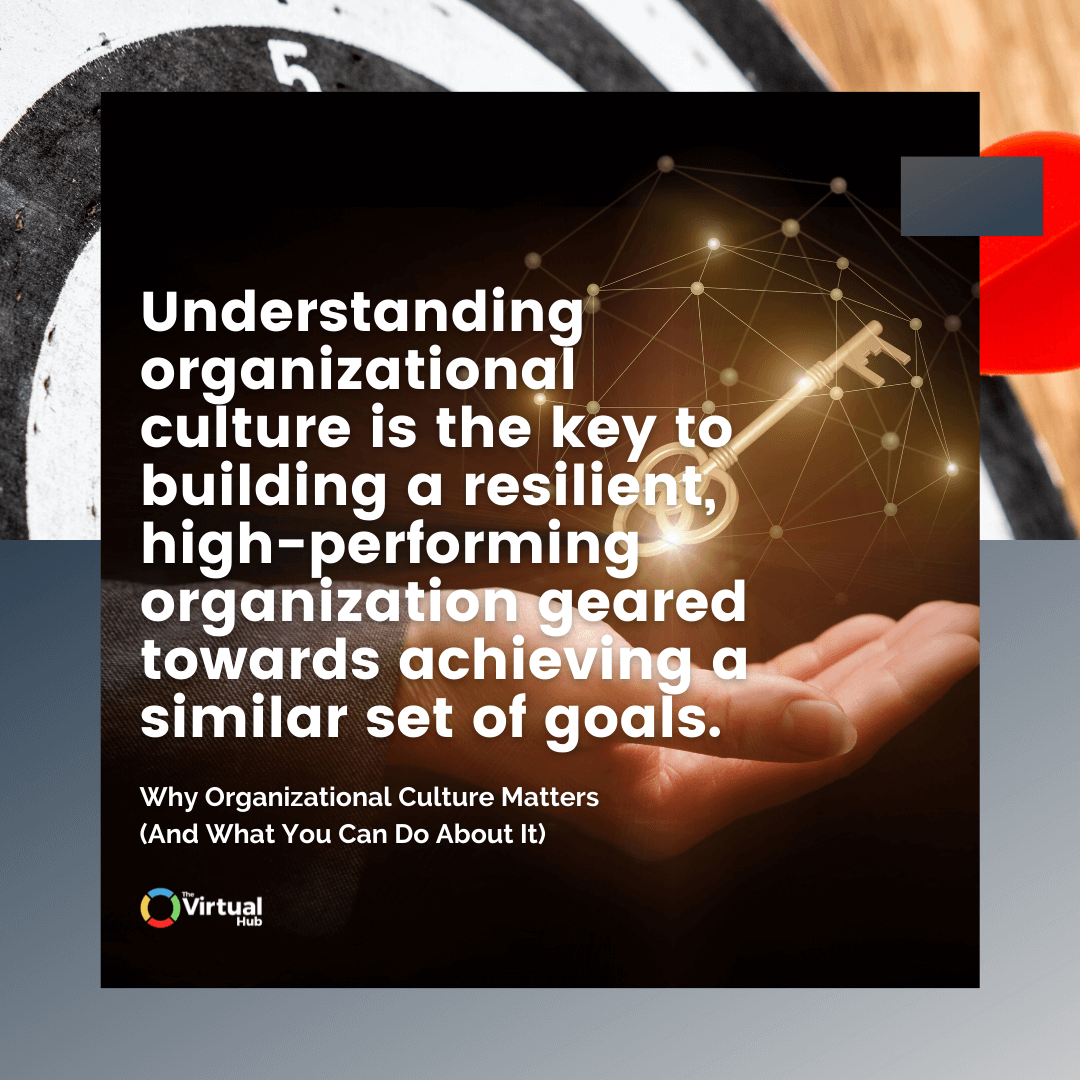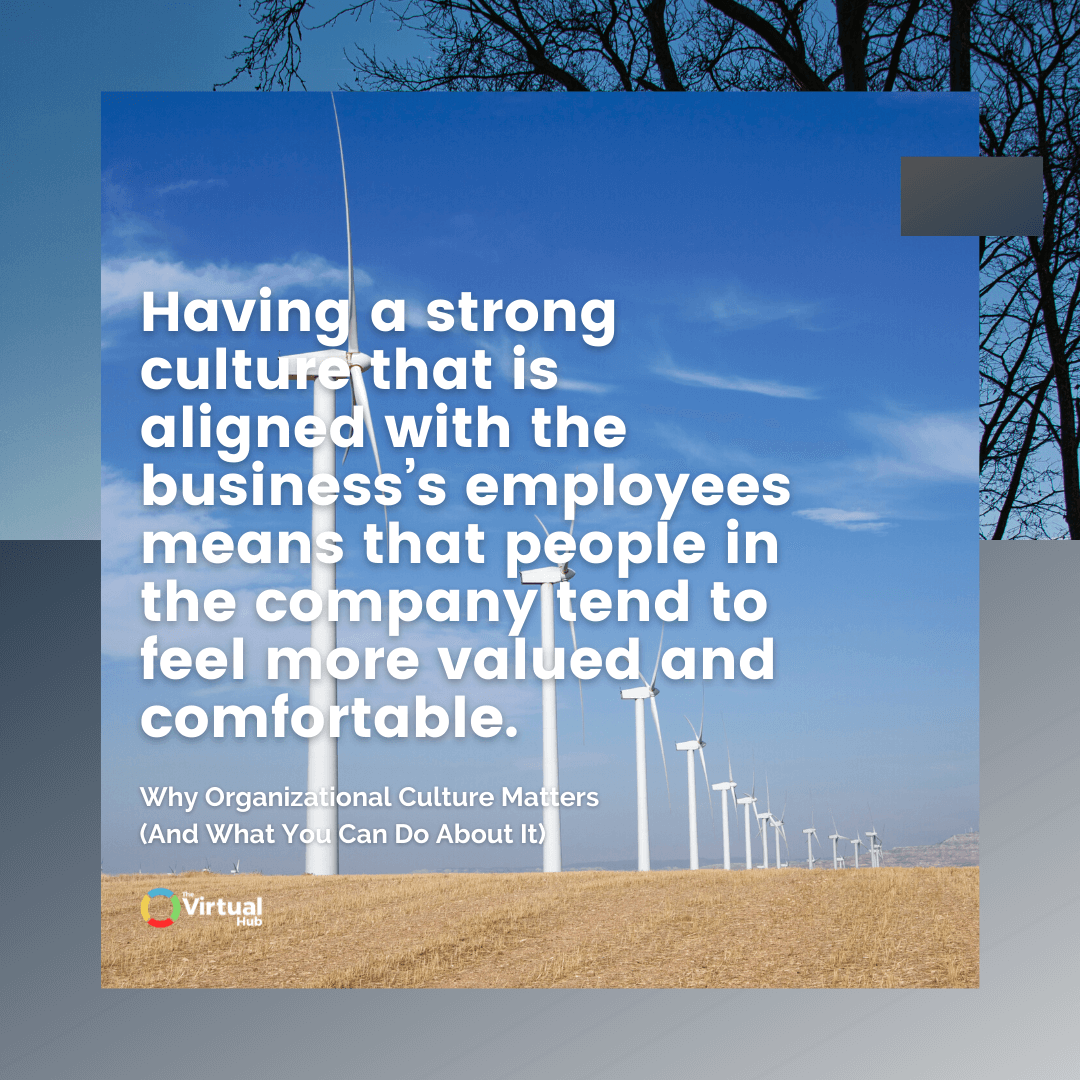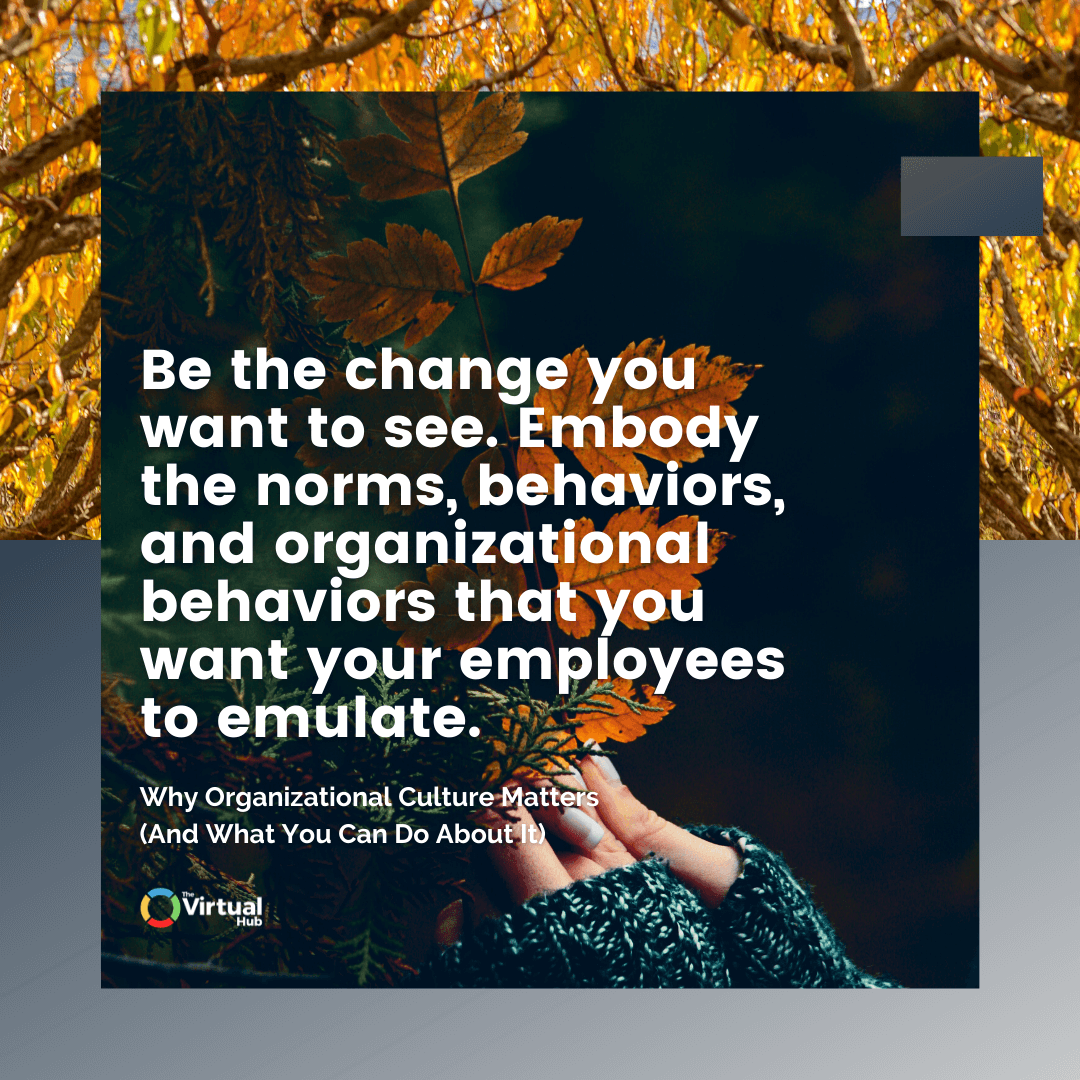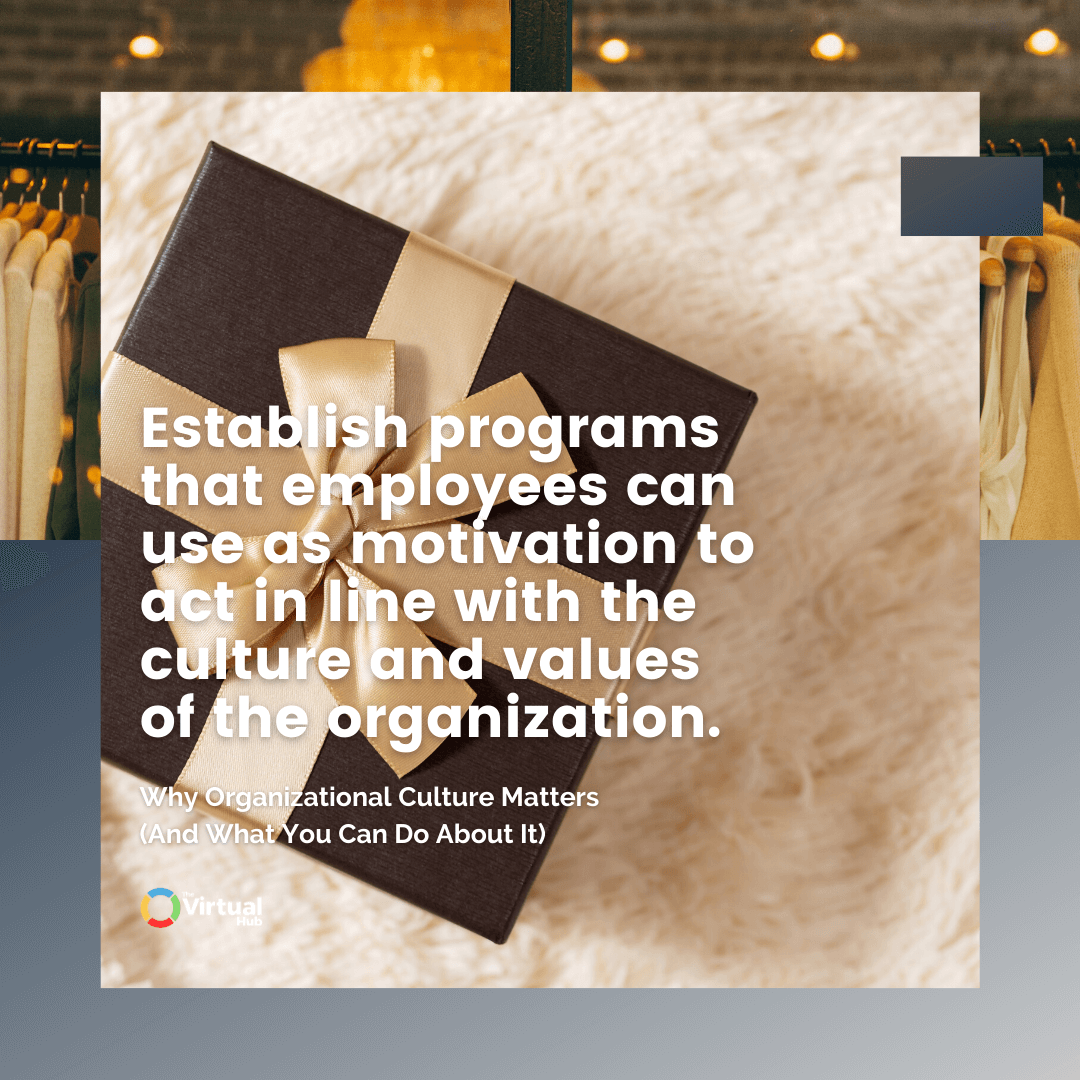Having an exceptional organizational culture is an essential ingredient for business success. This guide shows you what organizational culture is and why it is important for your business. It also teaches you how you can develop or change the prevailing culture in your company to help you achieve your business’ goals.
RELATED: Culture Eats Strategy! - The Importance of Organizational Culture
Organizational culture is your company’s personality. It is also referred to as company culture, business culture, or corporate culture. In not so many words, it is “the way things are done here.”
Organizational culture is defined as a set of behaviors, norms, and values that your employees adhere to. It guides the behaviors of the members of an organization. It also informs them on what they can expect from the company, as well as what the company expects from them.
An organization’s culture is often expressed in the employees’ self-image. It is also seen in their interactions with colleagues, and in their inner workings. It includes the organization’s mission, vision, and language.
It is based on the shared values, traditions or customs, practices, rituals, and underlying assumptions that have been developed within the company over time. This includes both written and unwritten rules of behavior.
Great business cultures exemplify positive traits. These lead to improved performances and greater productivity.

This is especially true in how they interact with their coworkers, clients, and with all other stakeholders. It influences how much employees are able to identify with their respective organizations in what is called a “culture fit.”
As a leader, understanding organizational culture is essential. It is the key to building a resilient, high-performing organization geared towards achieving a similar set of goals.

What Are The Different Types of Organizational Culture?
There are many different types of organizational culture (and even sub-cultures). For the purposes of this discussion, we can break them down into four:
- Clan Culture
A clan culture is focused primarily on teamwork and mentorship. It is defined by integration, flexibility, discretion, and a general sense of internal focus.
Clan culture is a people-oriented culture wherein the company feels like one, big, happy family. Communication is highly prioritized and the work environment is collaborative. Companies that have a clan culture are generally action-oriented and flexible in nature.
They boast a high rate of employee engagement which leads to better customer service. Unfortunately, the horizontal leadership structure can result in cluttered operations.

- Adhocracy Culture
An adhocracy culture puts great focus on innovation and risk-taking. It is defined by differentiation, discretion, flexibility, and a general sense of external focus.
Adhocracy cultures are based mainly on innovation. Companies with a culture like this are always aiming to develop that next big thing. This culture values individuality and diversity. Here, everyone is encouraged to share their ideas and think creatively.
This culture contributes to notoriety and high-profit margins because of the high employee motivation to stand out. However, it can also foster intense competition between employees. Additionally, innovations always run the risk of not panning out.
- Market Culture
A market culture is focused primarily on growth and competition. It is defined by differentiation, external focus, control, and stability.
Market cultures put heavy focus on profitability. This means that things are measured with the bottom line in mind. A results-oriented culture, this focuses less on internal satisfaction and more on external successes. These include meeting quotas and reaching targets.
Companies that have this culture are often highly-competitive, successful, and profitable. Because it is a numbers game, however, employees may find it difficult to engage with their work in a meaningful manner.
- Hierarchy Culture
A hierarchy culture emphasizes structure and stability. They are defined mainly by control, integration, and internal focus.
Hierarchy cultures follow the more traditional corporate structures. It relies heavily on a clear chain of command. Often, there are numerous management tiers separating the employees from leadership.
Hierarchy cultures typically have a clearer direction. However, this rigidity also has its drawbacks as it leaves little room for innovation. It also tends to discourage employee engagement and feedback.

How Does Organizational Culture Influence Your Company?
Company culture, while intangible, can have a massive impact on almost all aspects of your business. This includes smaller details such as employee punctuality. It also goes all the way up to bigger issues like employee benefits and contract terms.
Having a strong culture that is aligned with the business’s employees means that people in the company tend to feel more valued and comfortable. This empowers the company and its people. It enables the organization as a whole to weather challenges and changes in the environment.
Additionally, culture plays a key role when it comes to attracting top talent and maintaining them.
In fact, a study shows that over 75 percent of workers consider corporate culture before applying for a job. Furthermore, almost 80 percent of employees consider the mission and purpose of a company before applying.
The same goes for maintaining talent. In the same study, company culture has been cited by almost 65 percent of respondents as their main criteria for job satisfaction and their reason for staying.

In fact, about 56 percent of respondents further elaborated that they prioritize culture fit over salary.
Prioritizing organizational culture has never been more important. Company culture and employee experience is a bigger factor for the younger generation than it is for the older ones.
Nowadays, the majority of the workforce is already made up of millenials. The US Bureau of Labor Statistics expects that by 2030, 75 percent of the workforce will already be made up of millenials.

How And Why Does Organizational Culture Change?
In many ways, organizational culture can be likened to a river.
It is constantly moving and shaping the environment around it over time. Similar to a river as well, the people who work in the organization play a big role in how the workplace culture is maintained. They can also affect how a culture change can begin to happen.
The culture of an organization is constantly evolving.
This happens as its members continue to develop unique, shared, corporate values around what they believe is right.
This is something that they gain from experiences and interactions over time. They continuously learn what actions, mindset, and practices yield success and praise, and what does not.
RELATED: Working In A Team Environment Can Get Easier With These Ideas!

What Are The Elements or Qualities of Great Organizational Cultures?
Every company is unique. Yes, it is important to retain the qualities that set your business apart from others. However, it is also important to acknowledge that there are elements that make up great organizational cultures.
- Alignment: This means that the objectives of the company and its employees are all working towards the same goal. Giving time for alignment of goals, purpose, and vision will help build a great organizational culture.
- Appreciation: Whether it’s a simple thank you note, a public kudos, a raise, or promotion, is key to an exceptional organizational culture.
- Trust: Having trust means having a sense of teamwork and knowing that you can rely on your colleagues whenever you try something new.
- Performance: Of course, valuing performance is always necessary. This motivates talented employees to compete, excel, and deliver results.
- Resilience: This is characterized by stability in the face of sudden change. Employees in a company that values resilience are able to watch out for and respond to changes easily.
- Teamwork: Collaboration, respect, and communication are the defining characteristics of teamwork among team members.

- Innovation: A culture of innovation lets companies maximize the resources, technologies, and markets they have. This means applying creative thinking to all aspects of the business. It also allows diversity in the workplace to flourish.
- Psychological safety: This means that employees are provided with the support they need to take risks. They are also empowered to provide feedback honestly.
What Can You Do To Improve The Culture In Your Company?
Changing an organization’s current culture is no easy task. Often, employees will meet these changes with resistance. This is especially true if the concepts you want to instill are not ones they are familiar with.
As a leader, it is your duty to make sure that employees understand that these changes will benefit them in the long run. You have to be able to show them that this new culture you are trying to implement is the best way to operate. You have to show them that this yields success.

Start by emphasizing what is truly important: Communicate the goals of your organization. Post your mission statement in visible areas and have employee engagement sessions. Talk about accomplishments if need be.
Conflicting messages on the unique culture you want to build in the company may just be counter-productive.
Cultural inconsistencies may demotivate employees. It might also portray management as disingenuous, and cause doubt in the company’s leadership.
Next, reward employees who show behaviors that reflect those that you want to establish. Similarly, discourage behaviors that contradict them.
Discouraging behaviors does not necessarily mean doling out punishments or causing prolonged discomfort. Instead, provide constructive feedback or written and verbal warnings.
Finally, be the change you want to see. Embody the norms, behaviors, and organizational behaviors that you want your employees to emulate. This is the most powerful tool you can use to implement the cultural change you want to see.

How Do You Implement Organizational Change and Build A High-Performing Culture?
- Hiring Practices
Getting the help of human resources is probably one of the first steps in building the company culture that you want. Their hiring practices can greatly change the roster of your company.
Traditionally, hiring used to be all about the skillset. Nowadays, recruiters also check the personalities of the potential hires. They make sure that they fit either the current culture of the company or the culture they want to establish.
Having employees who fit into the company’s culture will help make sure that they deliver better performance. In the long run, this will also improve employee retention.
As much as possible, during the hiring process, make sure recruiters are honest about the culture you want to build. Do not paint inaccurate pictures of the business to attract candidates.
Additionally, try to make sure that there is more than one or two people involved in the hiring process.
- Onboarding Programs
Of course, all new members of an organization will have to undergo a new employee orientation.
Maximize this opportunity to make sure that every new employee understands what is expected from him. Additionally, try to make sure that they have job experiences early on to reinforce that culture.

- Recognition and Reward Systems
Next, establish programs that employees can use as motivation to act in line with the culture and values of the organization. Bonuses and rewards should be given to those who embody the values of the company.
- Performance Management
Having performance management sessions with employees is also crucial. It is a great avenue for the employees to share their aspirations with management. It allows them to understand what is expected from them, while also providing them a way to give their employers feedback as well.
In turn, this leads to a sense of cohesiveness and common purpose that enables a team to perform better.
Whether you like it or not, organizational culture will develop with or without your help. Without proper guidance, however, this may not grow into something that is productive or healthy. Follow the steps in this guide and start creating a culture for the betterment of your business.
Do you have any questions about organizational culture? Ask us in the comments section below!
Up Next:
- 11 Employee Engagement Ideas For A Lucrative Business
- Leadership Vs Management: 5 Things You Should Know
- The Four Decision Making Styles: Which One’s Your Style?
